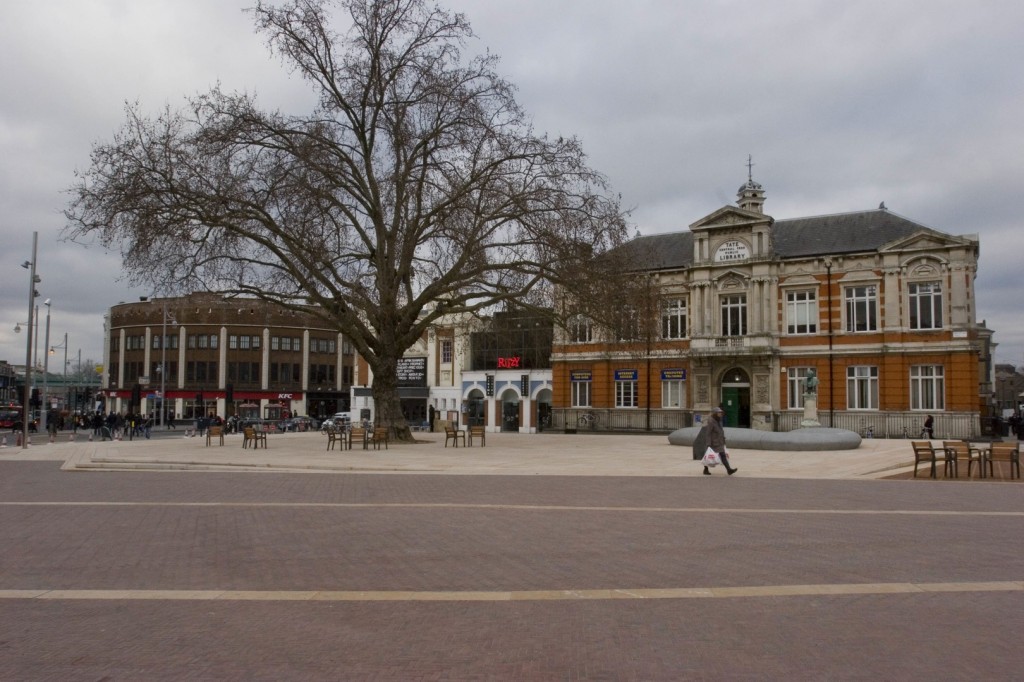In response to the Ritzy’s comment piece about their use of Windrush Square, chair of the Brixton Neighbourhood Forum Devon Thomas argues that many in the community feel they are being excluded in the developing new Brixton
There were some strong opinions voiced at the Brixton Neighbourhood Forum meeting
last Tuesday 12 June at the Brixton Community Base, regarding the Ritzy’s use of space at Windush Square. There wasn’t total objection to this use but to the amount of space being occupied and the attitude of Ritzy staff to other users of the square that appeared to be ‘exclusivist’.
I have been involved over years in many of the regeneration efforts that have taken place in Brixton and indeed helped to win the bid that financed the refurbishment of the Ritzy and Windrush Square.
I’m also chair of the Raleigh Hall Action Group, that fought for many years to get that building, situated adjacent to the Ritzy and Brixton Tate Library and one of Brixton’s oldest, for the Black Cultural Archives as a National Heritage Centre. This final piece of the puzzle, to complete the regeneration of the heart of Brixton, is planned to be completed in the middle of next year and so I’m fully behind the drive to improve the area and create a positive future for the next generation but we need to be mindful that these developments have to be inclusive.
There has been a keen debate over the past few days, in the national media, about the growth of privatised space in the public realm and how the management of these spaces by private interests for market purposes, can exclude those who can’t afford to pay to use them indeed they get moved on by private security or made to feel unwelcome.
The ‘unwanted users’ alluded to by the Ritzy correspondent may have annoyed some of the rest of us at times, but given the fact that the area is ‘common land’ by ancient statute, they had every right to use it as much as the Ritzy does as long as they didn’t break the law.
Indeed the criticism of this usage is not primarily targeted at the Ritzy or its management but at Lambeth Council for not being open about how this arrangement was arrived at and whether the community was properly consulted about it.
There are many bars and cafes in Brixton that would have loved to have had the opportunity to utilise this space and simply because the Ritzy is located nearby doesn’t mean that it should have the monopoly of the use of this particular space. It belongs to all of us and it was renamed ‘Windrush Square’ to commemorate the settlement of people from the Caribbean in the area who arrived on the eponymous ship after the Second World War, many of whom were ex-serviceman who had served in it.
Many in that community now feel that their needs are not being sufficiently considered in the developing new Brixton.
They feel that their interests are being marginalised by market forces on one side, that they don’t have the financial resources to compete with or resist.
They also feel that council policies aren’t sensitive enough to ensure that everyone gets a reasonable opportunity or that they are ‘redressing the imbalances’ caused by these market forces. The pubs, bar, clubs, cultural institutions and shops that used to cater for them have been displaced along with the public services that catered for their most vulnerable, now lost in budget cuts.
In a recession particularly, those with financial resources can clean up while those without get increasingly marginalised.
Brixton has had a history of what happens when people, particularly young people, are not listened to and adequately catered for – we saw this graphically illustrated last August! In Martin Luther King’s famous quote, ‘riots are the cry of the unheard’!
Our area has become increasingly affluent and I don’t have any problems with that. Indeed, three generations of my family have now grown up in the area, with my granddaughter recently going off to university, but not all boats are rising and those that are not get more dependent on the use of public spaces such as libraries and open spaces to make their lives liveable.
Let’s see how those who are the haves can contribute to those who have not in these difficult times, and let Lambeth Council address specifically how those who fought to sustain the community in early more difficult times can have their presence acknowledged and their needs catered for.
Check out the link below to get a little flavour of what I’m talking about!
http://www.youtube.com/watch?v=xEUMOIfn2Go
Devon Thomas is Chair of the Brixton Business and Neighbourhood Forums








Who ever the Urban SpaceMan is you talk great sense, it seems a few people can moan and complain and because they are complaining everyone has to listen …..bosses/council get worried and feel they have to take action.
With regards to the Ritzy they have a 20 square foot area by the tree near the busy main roads and everytime i pass it it is always very busy (by people who dont shout to everyone). I asked a security guard there can anyone just sit here and read or do they have to buy something …he replied no that is fine anyone can sit here as long as your not eating food from else where as its our staff that has to clear the mess …this seemed more than reasonable…so why is everyone (haha i mean about a dozen) moaning….bloody enjoy it like 100’s of us do daily.
“There are many bars and cafes in Brixton that would have loved to have had the opportunity to utilise this space and simply because the Ritzy is located nearby doesn’t mean that it should have the monopoly of the use of this particular space.”
so you wanna buy a pint in the Efra and walk to the square to sit at a table? C’mon let’s keep the debate grounded please
I agree there is a discussion about public/private space to be had, but on balance I think letting people buy a drink and sit in the square is (so far) a good use for it
on the other hand, if some grumps wanna sit in the chairs without buying anything, then the Ritzy might just have to put up with it because it is a public space
sorted!
I don’t know who Urbanspacemen is as he posts anonymously, but I do know who Devon Thomas is because he has a long record or working within the community of Brixton. So if he says there are people in the community who are concerned “… that their needs are not being sufficiently considered in the developing new Brixton”, then I think that’s a view we have to take seriously, rather than nitpicking.
As I read his post, Devon is not saying people don’t want Brixton to change; he’s just emphasising that there’s a range of people with different needs in Brixton, and all of them have a right to believe that their particular views and needs are being taken into account in leading that change.
This really sounds like the language of politics. So many words to say nothing useful at the end…
It would be really helpful if Devon Thomas could be more specific, and explain more precisely his various concerns.
Here are some questions that occurred after a close reading of his piece.
1) Have other bars and cafes applied to Lambeth Council, and have they been turned down ?
2) What is his definition of Community ? Is the Community defined by living within a geographical area, length of tenure in that area, or are there other considerations that must be satisfied ?
3) Which members of the community feel their needs are not being met and what precisely is the nature of those needs ?
4) How does the use of a portion of Windrush Square by the Ritzy interfere with the provision of such needs ?
5) Precisely what is the nature of the interests that are being marginalized by market forces ?
6) What are the identifying characteristics of the people who need financial resources to resist or compete ? Given such financial resources, how would they implement such resistance or competition ?
7) Is DT suggesting that Lambeth should modify its planning process to favour one category of applicant and exclude others ? What are the identifying characteristics of these groups ?
8) Can DT give any concrete examples in Brixton of the “cleaning up” that he mentions ?
9) Is there a demonstrable link between the increasing prosperity of Brixton and the propensity of young people to riot ?
10) Concerning the people who have fought to sustain the community, can DT describe in more detail the nature of the needs that Lambeth Council should satisfy and what mechanism he would like Lambeth Council to implement to acknowledge their presence ?